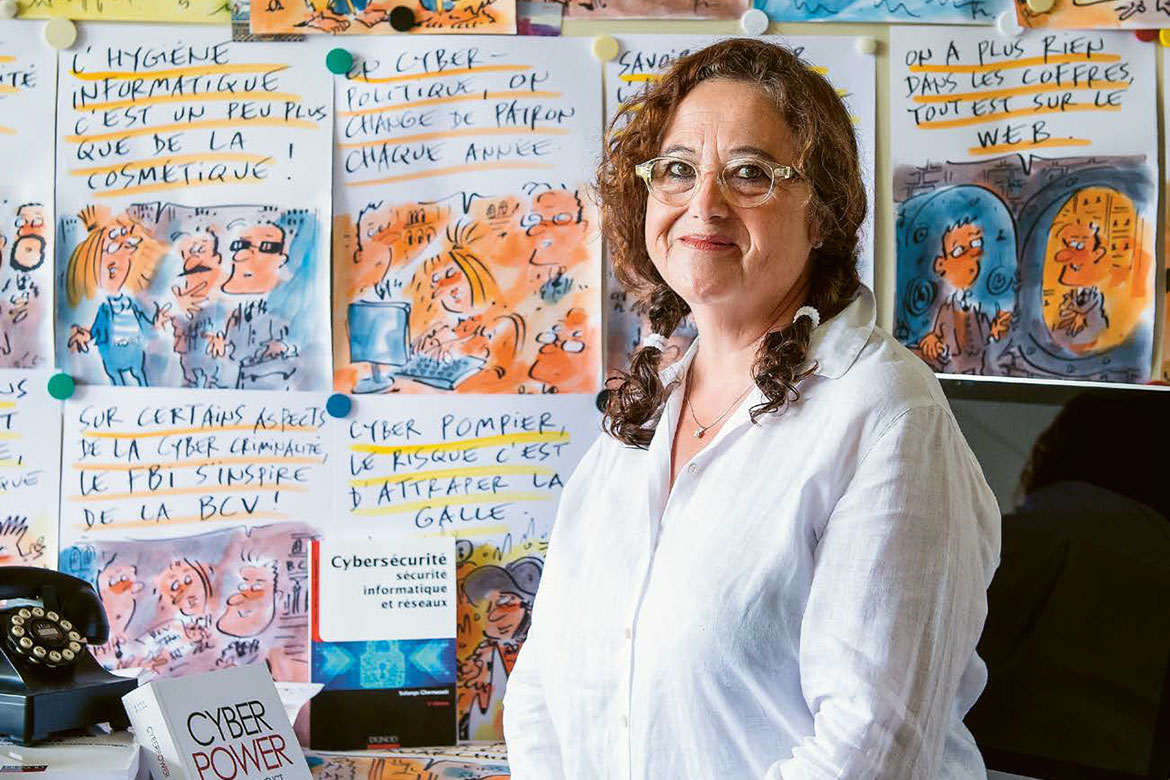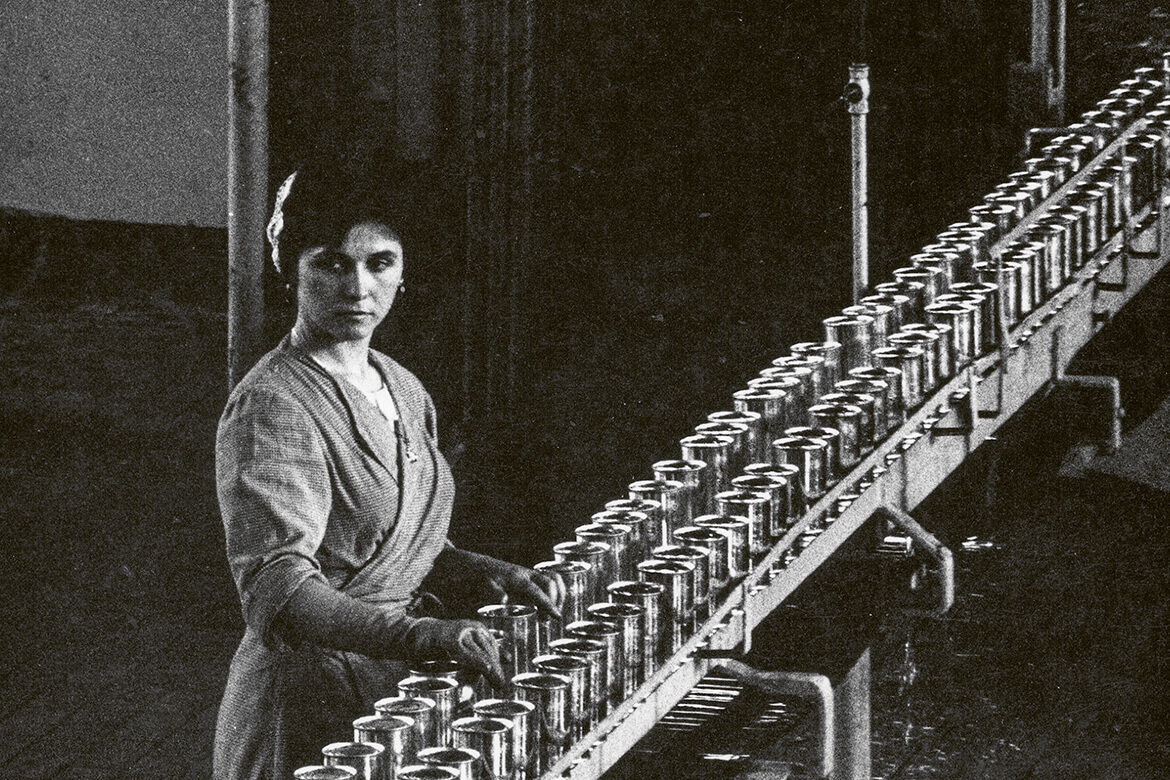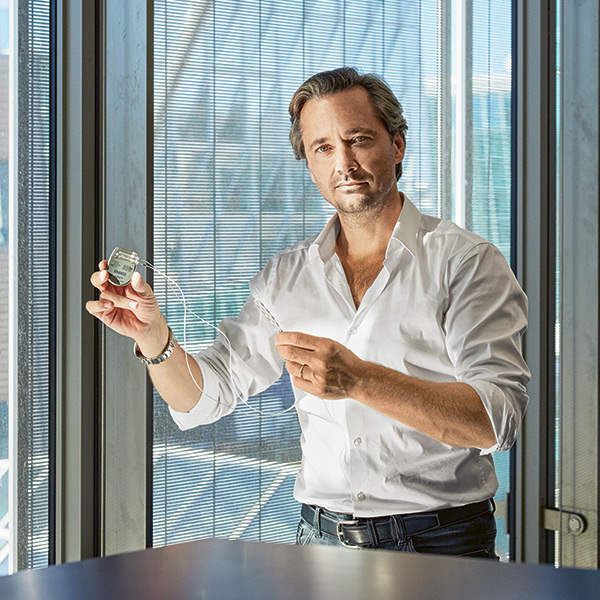A pioneer of cyberspace
Solange Ghernaouti is a world leader in digital security. Horizons meets the straight-talking fighter.

Picture: Valérie Chételat
When we asked 58-year-old Solange Ghernaouti if she was a woman in a man’s world, her reply was, “I am a scientist who wants to understand and to share: that’s asexual”. She went on to add, “but I am not a man. Let’s be clear about that. I believe humans complement each other”. In her office of 30 years, Ghernaouti walks about barefoot with her hair tied youthfully, and is followed everywhere she goes by her dog Swak, even to her lectures. Ghernaouti is a professor in computer security at the University of Lausanne and she wears this badge proudly.
“The moment we expose ourselves, we run the risk of not being appreciated. But I don’t care, what’s important is being respected”. Before specialising in the security of telecommunications networks, Ghernaouti started out designing them. She went on to become an authority figure in cyber security. Her books have since been translated into Chinese, she gives conferences around the world and she advises governmental and United Nations bodies.
She is known to her entourage as a fighter, and she is currently fighting for a ‘Geneva Declaration of Cyberspace’ to govern the digital environment, to set forth the specific rights of Internet users and to define the limits to acceptable practices. “Just as with the climate and the environment, we must reflect upon what kind of cyberspace we would like to hand down to our children”.
360-degree vision
Ghernaouti claims to take an interdisciplinary approach to cyber security. Her projects look at not only technology and risk management but also philosophical, social, economic and political dimensions. In this regard, her concerns extend from the impact of computer conglomerates on our private life to the rise in Internet criminality. This approach does not win her very many friends. In 2015 the website of her research team, the Swiss Cyber Security Advisory and Research Group, was hacked, apparently by the Islamic State. “I marked that one down to experience. It was a lesson in cyber security from the victim’s perspective”.
But it would take a lot more to upset Ghernaouti. When she was very young she had to fight to take her own path. She was born to French parents in Algeria during its war of independence. Her father was a geologist in the Sahara and she has a brother who is one year older than her. Before long, her family returned to Paris. “We were not rich. My mother was always very proud to be able to put food on the table every day”.
Ghernaouti was a dreamer, fascinated by dictionaries, and dyslexic at a time when the disorder was still relatively unknown. “There are so many letters in my surname that I used to mix them all up!”, she says, smiling. She was placed with the dunces at the bottom of the class, and it was only thanks to her ability in mathematics that she lifted herself from that position and successfully left school at 16 years old. “It was because I had to fight continually that I became as strong as I am”.
As she progressed through adolescence, she became inspired by Leonardo da Vinci. “I was fascinated by his ability to invent and to think into the future, but above all by his mirror writing”. She demonstrates by taking a pen in each hand and writing the same sentence simultaneously both left to right and right to left. That’s not bad for a dyslexic girl who used to have difficulty holding a pen. The same can be said of the 30 books she has published, including the first entitled “What do I know? [Que sais-je?]” about the Internet, co-authored by Arnaud Dufour.
Independence firs
In the mid-1970s, she left home and her strict upbringing to go into computer studies. “It was the innovative and abstract sides to this discipline that attracted me. Just as a child does with a new toy, I wanted to know exactly how it works and what one can do with it”. To finance her studies, she worked as a carer, maths teacher and neuropsychiatrist, before creating her own company to provide software development services. “It was fun, but really I was just trying to get by. I wanted to be independent and not to have any favours to repay”. Having obtained her PhD, she applied to the University of Lausanne and, at 28 years old, became the first female professor in an applied business school, where she still works today.
“Ghernaouti is an exceptional person, she is an extraordinary researcher who identifies new topics to look into and she knows how to get her staff to work”, says Igli Tashi, a former doctoral student and now head of computer security at the Vaud Cantonal Bank. “But what I admire most, beyond any form of prejudice, is her open-mindedness”.
Years later she gave birth to a young girl. She sees it as a “wonderful adventure” but also an “extreme marathon”, because she was both a single mother and a career woman. “That’s the real achievement and no one cares!”, she says, adding, “I was on the verge of quitting almost every day”. Her colleague, the biologist Liliane Michalik, describes her as “a very brave and generous woman, devoted to her child and to her work” in a macho academic environment. Despite this, Ghernaouti still finds the time to go one step further: for more than 10 years she has chaired the university’s social committee and its equal opportunities committee. “It’s normal, almost a duty in terms of solidarity and setting a female role model”.
Today she spends her spare time with her daughter, her books and her friends. She likes the forest, stargazing, and dreams of keeping chickens. She takes long daily walks with her dog: “this is the time I use to revitalise my mind, think outside the box and organise myself. In fact, it’s my dog who walks me!”, she says, laughing. But her driving interest is understanding, thinking and sharing. “I want to be always open to new ideas. That’s a way of living. People who only see restrictions cannot appreciate that, but personally I find it elating”.

Born in Algeria in 1958, Solange Ghernaouti obtained her PhD in computing and telecommunications in 1986 from the University of Paris VI. In 1987 she was appointed professor of the business school of the University of Lausanne. She is a member of the Geneva Centre for Security Policy and the Swiss Academy of Engineering Sciences and a participant at the French national defence institute IHEDN in Paris. In 2014 she was appointed a member of the Legion of Honour. She is a French-Swiss citizen and has one grown-up daughter.
Martine Brocard is a journalist for ATS, Les Alpes et LargeNetwork.




